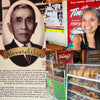

THE SWEET AND TRANSFORMATIVE SUCCESS OF DRAGONFLY CAKES
Jan 23, 2024
Odette D’Aniello started decorating cakes at age 10, a job she chose because it meant working in the only air-conditioned room at her cousin’s bakery on Guam. It was an upgrade from slicing loaves by the hundreds in the tropical heat. In the decades that followed, D’Aniello parlayed the skills she picked up as child labor for the family business into a thriving cake company that specializes in petit fours.
D’Aniello’s Dragonfly Cakes produces petit fours: tiny, intricate, beautiful cakes that are the opposite end of baking from her pre-teen days of frosting 50 cakes a day at fast-forward speed. When D’Aniello purchased Dragonfly in 2016, the name held special appeal. “Dragonflies are about transformation, and so is baking: the transformation of raw materials into this alchemy, this beautiful and tasty thing.”
Dragonflies do what scientists call an incomplete metamorphosis, skipping directly from the pupal stage to adulthood—an all too apt metaphor for D’Aniello’s own life.
Her great uncle, who she called Lolo Tinog, was the illegitimate son of a wealthy Chinese merchant on the island of Cebu and the first baker in D’Aniello’s family, she said. Disinherited at his father’s death, her great uncle apprenticed at a bakery starting at age 13. Years later, after World War II ravaged the Philippines, Lolo Tinog made an oven out of a gasoline barrel and combined the skills he learned at the bakery with U.S.-supplied rations to make bread, eventually building a thriving bakery of his own.
When her parents struggled to raise their three small children on rural teachers’ salaries, D’Aniello’s mother used what she’d learned at her uncle’s bakery to make a light Filipino sponge cake called mamon, which she sold first to coworkers, then all over town.
Word of the woman baking amazing mamon in the provinces reached Lolo Tinog’s youngest son, Ambrose, who had taken over his father’s bakery. He reached out to try to buy the recipe, only to find out that the baker was his cousin. He hired her to come and make the cakes for his bakery. Not long after, he moved to Guam, leaving D’Aniello’s mother to manage the bakery’s 50 employees. D’Aniello grew up there, playing among the flour and big machines.
When D’Aniello was 10, Ambrose called again: he had a bakery on Guam and wanted D’Aniello’s parents to come help him with it. That D’Aniello herself and her 11-year-old brother came, too, was icing on the cake. “First thing from the airport, they brought us to the bakery and said, ‘Your job is to slice 200 loaves of bread,’” she remembers. “It was not very fun.”
She went to school, came home, and sliced bread. While other kids played, she wrapped loaves and tried not to melt in the crippling heat of the afternoon. The cakes, she realized, didn’t melt in the same heat, because they were kept in an air-conditioned room. She changed jobs, starting out by writing on the cakes. “I would try to make flowers and I’d get in trouble,” she remembers. “Then they saw that I was pretty good.” It was still not very fun.
But the family’s hard work allowed her parents to open their own bakery and send her to good schools, then on to college at the University of Arizona. D’Aniello, like her parents, trained as a teacher, thinking she left her bakery days half a world away. She met her husband, also a teacher, and they moved to Lacey, Washington.
But they struggled to find jobs, and like her parents and Lolo Tinog before her, she returned to baking. “The power of resilience, the power of grit, transformation nd seeing things through,” she says, “those are all gifts. Trauma comes with a gift, and what you focus on is your choice.”
In 1999 they opened a café in Lacey, serving all-you-can-eat sandwiches on fresh bread with housemade desserts. “We would have a line out the door, but we couldn’t make money,” she laughs. But she had an infant and was desperate, paying her mortgage on a credit card.
Then, she happened by a wedding show at the Tacoma Dome. “Oh my god, people just make wedding cakes,” she marveled. They didn’t make the breads she labored on as a child and struggled to make profitable at her café. “They just do wedding cakes, all these big, gigantic wedding cakes that I learned how to do at age 12.” She spoke with vendors and learned they were just baking them at home—no rent to pay—and made $300 on each. “That’s like 60 sandwiches,” she thought.
She spoke to the man who hosted the show, who told her if she did the show, she’d never have to worry about selling a three-dollar croissant again in her life, and she handed over her credit card. “I knew how to do the skills,” she said, but she had no idea on the marketing. She copied pages from a book by Wilton, the cake supply company, and made a brochure. It worked.
“One day we were doing sandwiches, the following day, I said, ‘We’re turning our café into a cake studio.’” From there, things began to look up. When D’Aniello’s sister, Mary Ann Quitugua, graduated college, she told her, “You’ll never have a starter job at McDonald’s.” Quitugua joined the business, working her way up to her current role as partner and COO, along with another cousin, Wallace, now the head of production.
In 2004, eight months pregnant, her husband back teaching to support the family, and Quitugua and Wallace depending on her, D’Aniello bought the Celebrity Cake Studio in Tacoma. She moved the business and expanded it, too: it came with contracts already in place. “We said, ‘Sure we’ll do that,’” D’Aniello recalls. “We had no clue what it was to wholesale.”
But D’Aniello figured it out, and also figured out her own strengths as a businesswoman. “It’s all about pivoting for us, just adapting because we’re immigrants and you just have to go with the flow. You just can’t resist reality. This is what’s happening, and we need to move forward.”
In 2016, she bought fudge company Wax Orchards. “We’ve never shipped nationwide before so I was like, ‘Well, I’m just gonna buy this little business, maybe I can learn how to ship nationwide. And what distribution is.”
Six months later, she heard about Dragonfly Cakes, a petit four company originally based in Sausalito, California. The business fit well with her new national shipping capabilities and local baking facilities, and the name made her swoon. “Everything is about a move forward,” she says. “It catapulted us into this level of scale.”
D’Aniello’s business celebrates its 25th anniversary this year, the culmination of a lifetime of hard work and struggles, with beautiful, pattern-breaking results.
D’Aniello’s daughter, who graduated from the University of Arizona with a management and information systems degree and currently heads the company’s marketing team, told her, “We can’t call it generational trauma, Mom. Maybe we should just call it generational superpower or something?” Her son, in his third year of college, plans to go to law school and then join his sister at the company. “They want to run the business with my sister,” D’Aniello smiles. “And I’m going to garden.”
For three generations of D’Aniello’s family, the baked goods that brought joy to so many represented child labor and a brutal battle against poverty. But her own children grew up seeing the bakery as a sugary heaven and an opportunity to build on a proud legacy.
Checkout the original article here.
Naomi Tomky (naomitomky.com), author of “The Pacific Northwest Seafood Cookbook,” writes about food and travel.




